It is a rare blue-skied day in the city of Baoding, in north-eastern China. It’s not even that clear, but the hazy sky is as blue as it gets here. Most days, the sky is obscured by a thick blanket of smog.
Baoding, a city of 10 million people, was named in February as China’s most polluted city by the Ministry of Environmental Protection, based on air pollution figures gathered for 2014. By mid-May of this year, the city had only enjoyed 16 days of air quality that could be considered “good” by the official classification.
“Generally, there is smog on most days,” says Mr Han, aged 66, who has lived in Baoding his whole life. He drives a motorbike that carries a carriage-like trailer, and parks outside the city’s main supermarket to ferry shoppers home for a small fee. “It was much better when I was young – the air was very clean,” he says. “We rarely see blue skies now.”
Expecting coal stacks and factories pumping out toxic fumes, I instead see farmland whizzing past the window as I approach Baoding on the high-speed train from Beijing. Even when driving around the city, it’s not immediately obvious what causes the pollution. The outskirts are home to one coal power plant that doesn’t appear to be in use, with no sign of workers and not a wisp of smoke from the big chimneys. Like an increasing number of plants in the province, it may well have been closed down as part of increased governmental anti-pollution measures.
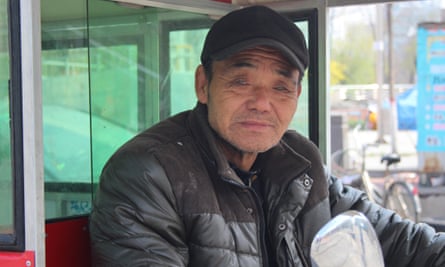
Yet, on a bad day, Baoding’s pollution levels can rise beyond 300 on the air quality index, which is classed as hazardous for human health. On these days, the smog clings to the city like a thick grey shroud, and its residents are ghost-like shadows moving through the haze. Visibility for driving is reduced and headlights and traffic lights glow eerily, barely visible. Air is not something you can normally taste but, on high-pollution days, there is a metallic tang that catches in the back of your throat.
Despite this, many of Baoding’s residents appear hesitant to discuss the city’s new status as China’s most polluted city, and when they do, are often defensive of it. “It’s OK in Baoding,” Mr Zhu tells me, pointing to today’s unusually clear skies. He is manning a food stand outside a small restaurant; over a hot stove, he prepares thick savoury pancakes filled with vegetables. Zhu says that his version of this popular snack food is the best in the city – and although he spends hours outside every day, he is not worried about the pollution, asserting his faith that the central government is doing something to improve the situation.
According to official figures, on the day I visit Baoding’s air quality is “good” , despite the fact that the level of PM2.5 particles – considered dangerous because they lodge deep in the lungs – is at 54 micrograms per cubic metre, more than double the maximum daily levels recommended by the World Health Organisation.
Baoding is located in the north-eastern province of Hebei, China’s pollution “ground zero” which is home to seven of the 10 cities that are ranked worst in the country for air pollution. Surrounding Beijing and with its industries centred in coal and steel, Hebei gets the blame for many of the Chinese capital’s headline-grabbing “airpocalypses”.
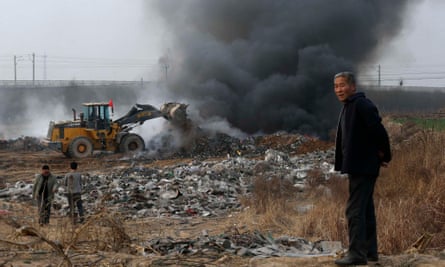
Pollution has become a controversial topic in China in recent months. In March, a hard-hitting documentary, Under the Dome, outlining the gravity of the country’s air pollution problem – which is estimated to cause the premature deaths of hundreds of thousands of people each year – went viral online. The hour-long film, directed by journalist Chai Jing, has been compared to Al Gore’s 2006 film on global warming, An Inconvenient Truth, and was viewed online more than 200 million times before being censored and removed.
Duan Chao, a doctor at a traditional Chinese medicine hospital in Baoding, confirms that he sees more patients during bouts of smog. “More people come when the air is not good,” he says. “There are more patients with breathing difficulties, people with coughs.” A traditional medicine called ban lan gen is used to treat respiratory illnesses when the smog is bad.
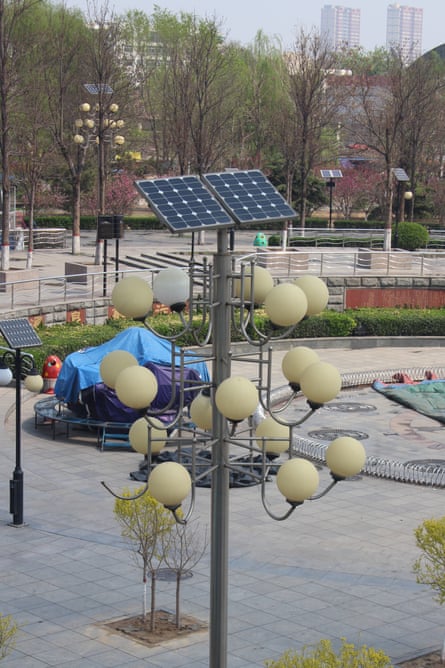
Duan says that awareness is rising in Baoding about air pollution. He takes a mask out of his pocket that he carries with him at all times. While a number of people are spotted wearing face masks, they are generally flimsy and loose fitting, or are surgical masks, which offer little or no protection against most pollutants. In main cities like Beijing and Shanghai, specialist face masks are widely on sale and many homes have air purifiers – but in Baoding, none of the people I interviewed had one at home.
The great irony here is that, in 2010, Baoding was named as a pilot of China’s new project to introduce low-carbon zones: an ambitious plan to use renewable energies to illuminate streets and heat residential buildings. As a result, the city has become a hub for renewable energy companies, including Yingli Solar, one of the world’s largest photovoltaic manufacturers.
Yingli is based in a massive industrial park less than 20 minutes drive from downtown Baoding. The complex seems to go on for miles, with solar panels lining the streets. A new building is under construction with walls made from solar panels; its slogan repeats Yingli’s mission to provide pollution-improving, affordable solar energy for all.
At Yingli, Ma Hongha, dressed in blue overalls, heads to start her shift with two of her colleagues. “Many people in Baoding work in this industry,” Ma says, adding that it is important for the city’s economy. She is reluctant to discuss the pollution, but acknowledges it has got worse since she was a child. But, she adds, “Baoding is improving. More solar panels will mean the world will be cleaner.”
The industrial area is also home to a number of manufacturers of blades for wind turbines, including Zhong Hang Huiteng Wind Power, one of the largest blade makers in the world. On the edge of the industrial park, turbine blades almost the length of a football pitch are loaded on to flatbed trucks for transportation. In total, around 170 companies related to renewable energy are located in Baoding.
Yet still the mystery of the city’s pollution was unclear to me. The city doesn’t have a high concentration of industrial plants around it; there are a lot of cars on the roads and car dealerships are plentiful, but that couldn’t account for the high levels of pollution. Local residents didn’t seem to know, either, or were reluctant to discuss it, though some blamed the weather and pollution from neighbouring cities.
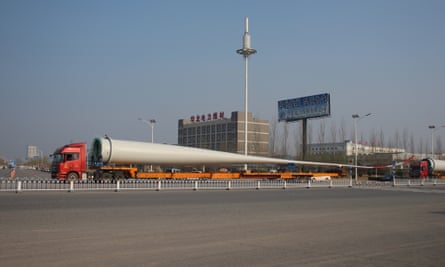
It was only when I came across local news reports that the cause of the city’s pollution became clearer. According to preliminary findings of an analysis carried out across Hebei, much of Baoding’s pollution comes from coal-fired steam boiler systems used in more than 100 provincial villages close to the city. These boilers are extremely polluting.
Tackling air pollution has become a national priority and, last year, premier Li Keqiang declared “war” on pollution. With its economy still largely reliant on coal-fired industries such as steel and cement, Hebei province is an important battleground in that war – with its authorities faced with the difficult task of balancing economic growth and environmental welfare.
Already some parts of Hebei are feeling the impact as plants are closed in an attempt to improve the smog in Beijing. The city’s Communist Party chief, Nie Ruiping, was quoted as saying: “It’s necessary to close some traditional factories to fight air pollution. We cannot sacrifice the environment to make money.” By harnessing the energy of its new industries, perhaps Baoding will not keep its unwanted new title for long.
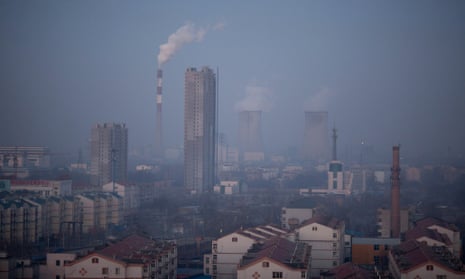
Comments (…)
Sign in or create your Guardian account to join the discussion